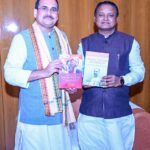BHARATIYATA AND ITS MANIFESTATIONS
- By : Anirban Ganguly
- Category : Articles
The spirit of Indianness finds expressions in many ways. But for the biased and the blinded, it has been reduced to symbolism and is exploitable
When Mirra Alfassa (The Mother) of Pondicherry (now Puducherry) declared that India was her “true country, the country of my soul and spirit” and that though she was French “by birth and early education” she was “Indian by choice and predilection”, the Mother was essentially speaking from a conviction that came from a deep and unconditional immersion into the essence of Bharatiyata.
Giving up an opulent and culturally avant-garde vie of a Parisienne that had brought her in close contact with some of the leading Western minds of the epoch, Mirra travelled, a century ago, to far-off Pondicherry, then a stagnant backwater, in order to live in India, dedicate her life to the country and pursue Sri Aurobindo’s sadhana and to begin, what would be, an uninterrupted five odd decades of service to India and to humanity. When she proffered the following message to a group who wished to work for India’s resurgence, “Let the splendour of Bharat’s past be reborn in the realisation of her imminent future with the help and blessings of her living soul”, the Mother was expressing a conviction that could only be born from a profound sense of Bharatiyata. And yet it was never through lectures, sermons or homilies that she sought to reinforce in those, who came in touch with her, this sense of Bharatiyata — she herself was a living embodiment of its essence.
When Sister Nivedita, wrote that it was “by a gradual and loving study of how she [India] came to be, can we grow to understand what the country actually is, what the intention of her evolution and what her sleeping potentiality may be” she was essentially pointing at the practice of evolving or enhancing this sense of Bharatiyata, a sense that she had herself marvellously imbibed from her Master.
It is in Nivedita’s words that one finds the best description of the essential Bharatiyata that Swami Vivekananda’s personality radiated. Describing the Swami’s personality and how it held within its cradle the essence of Indianness, Nivedita movingly wrote, “He had learnt, not only the hopes and ideals of every sect and group of the Indian people, but their memories also…The songs of Guru Nanak alternated with those of Mirabai and Tansen on his lips. Stories of Prithvi Raj and Delhi jostled against those of Chitore and Pratap Singh, Shiva and Uma, Radha, Krishna, Sita-Ram and Buddha…His whole heart and soul was a burning epic of the country, touched to an overflowing of mystic passion by her very name.”
When Nivedita exhorted the nationalist youth, who had gravitated towards Vivekananda’s message, to internalise and work for “jana-desh-dharma” she was uttering a sutra of national service inspired by an intrinsic identification with the spirit of Bharatiyata. In their approach to India, in their absorption and adoption of her spirit, both Mirra and Nivedita were unflinchingly one-pointed. For them India was not a place de convenance but rather the seat and the guiding light of their spiritual quest. For those who have been forced to adopt this country, not out of some core inner conviction and call but out of utilitarian compulsions and propensities, these exalted experiences and utterances are naturally hard to comprehend, leave alone internalise. It is a highly compartmentalised and superficial ‘idea of India’ and ‘Bharatiyata’ that these types stutter to espouse, unable to grasp the larger and deeper significances and dimensions of these terms.
When Narendra Modi brought back from Geneva, the ashes of the master revolutionary Shyamji Krishna Verma, after 55 years of India’s independence and erected a grand memorial in his memory, thus fulfilling Verma’s last wish, articulated before his death in 1930 on foreign soil, he was acting under the profound impulse of an ineradicable sense of Bharatiyata. Parasitical minds and reductionist world views can hardly ever hope to comprehend the immeasurable capacities of that impulse. After all Bharatiyata is not to be gleaned or felt, explained or imbibed through politically motivated half-speeches, superficial allusions and doomsday talk.

















